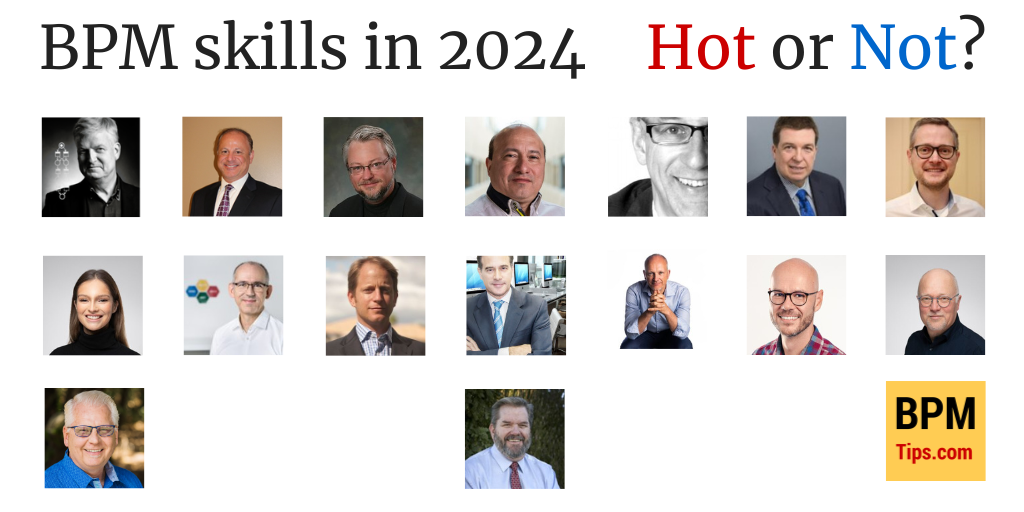Like in the past years I have a great pleasure to present you new post from the “BPM skills” series. You can read the past editions here.
What to expect in 2024? Which skills will be hot?

Since my clairvoyance skills are rather weak I want to invite you to read the thought provoking answers from 10+ BPM experts.
PS. At the end of the post you will find a link to “New Process Podcast” episode #44 where Mirko and I talk about the “BPM Skills” cycle.
As always, you can either read everything or use the navigation below. Enjoy!
Wil van der Aalst
Tony Benedict
Lloyd Dugan
Marlon Dumas
Ian Gotts
Mathias Kirchmer
Mirko Kloppenburg
Harald Kühn
Brian Reale
Pedro Robledo
Michal Rosik
Michael Rosemann
Serge Schiltz and Naïla van Kommer
Jim Sinur
Roger Tregear
Podcast episode
Which BPM skills will be hot in 2024
Now, let’s dive into the answers.
Prof. Wil van der Aalst
 Prof.dr.ir. Wil van der Aalst is a full professor at RWTH Aachen University, leading the Process and Data Science (PADS) group. He is also the Chief Scientist at Celonis, part-time affiliated with the Fraunhofer FIT, and a member of the Board of Governors of Tilburg University. He also has unpaid professorship positions at Queensland University of Technology (since 2003) and the Technische Universiteit Eindhoven (TU/e). Currently, he is also a distinguished fellow of Fondazione Bruno Kessler (FBK) in Trento, deputy CEO of the Internet of Production (IoP) Cluster of Excellence, co-director of the RWTH Center for Artificial Intelligence. His research interests include process mining, Petri nets, business process management, workflow automation, simulation, process modeling, and model-based analysis. Many of his papers are highly cited (he is one of the most-cited computer scientists in the world and has an H-index of 161 according to Google Scholar with over 121,000 citations), and his ideas have influenced researchers, software developers, and standardization committees working on process support. He previously served on the advisory boards of several organizations, including Fluxicon, Celonis, ProcessGold/UiPath, and aiConomix. Van der Aalst received honorary degrees from the Moscow Higher School of Economics (Prof. h.c.), Tsinghua University, and Hasselt University (Dr. h.c.). He is also an IFIP Fellow, IEEE Fellow, ACM Fellow, and an elected member of the Royal Netherlands Academy of Arts and Sciences, the Royal Holland Society of Sciences and Humanities, the Academy of Europe, and the North Rhine-Westphalian Academy of Sciences, Humanities and the Arts. In 2018, he was awarded an Alexander-von-Humboldt Professorship.
Prof.dr.ir. Wil van der Aalst is a full professor at RWTH Aachen University, leading the Process and Data Science (PADS) group. He is also the Chief Scientist at Celonis, part-time affiliated with the Fraunhofer FIT, and a member of the Board of Governors of Tilburg University. He also has unpaid professorship positions at Queensland University of Technology (since 2003) and the Technische Universiteit Eindhoven (TU/e). Currently, he is also a distinguished fellow of Fondazione Bruno Kessler (FBK) in Trento, deputy CEO of the Internet of Production (IoP) Cluster of Excellence, co-director of the RWTH Center for Artificial Intelligence. His research interests include process mining, Petri nets, business process management, workflow automation, simulation, process modeling, and model-based analysis. Many of his papers are highly cited (he is one of the most-cited computer scientists in the world and has an H-index of 161 according to Google Scholar with over 121,000 citations), and his ideas have influenced researchers, software developers, and standardization committees working on process support. He previously served on the advisory boards of several organizations, including Fluxicon, Celonis, ProcessGold/UiPath, and aiConomix. Van der Aalst received honorary degrees from the Moscow Higher School of Economics (Prof. h.c.), Tsinghua University, and Hasselt University (Dr. h.c.). He is also an IFIP Fellow, IEEE Fellow, ACM Fellow, and an elected member of the Royal Netherlands Academy of Arts and Sciences, the Royal Holland Society of Sciences and Humanities, the Academy of Europe, and the North Rhine-Westphalian Academy of Sciences, Humanities and the Arts. In 2018, he was awarded an Alexander-von-Humboldt Professorship.
WWW: http://www.vdaalst.com
WWW: LI profile
Twitter: @wvdaalst
What is the impact of GenAI on process management?
Both generative and predictive AI complement process management in three different ways. The current focus is on GenAI, but this does not replace other data-driven techniques like predictive AI and process mining! The distinction between generative and predictive Artificial Intelligence (AI) is crucial in understanding their roles in process mining. Generative AI focuses on creating new data or patterns, like ChatGPT, which generates human-like text. Predictive AI, on the other hand, analyzes existing data to predict future outcomes. Advances in AI are mostly fueled by breakthroughs in Machine Learning (ML); therefore, the terms are often used interchangeably. Large Language Models (LLMs) like ChatGPT have experienced a rapid uptake across various industries due to their advanced natural language processing capabilities. Their ability to generate human-like text, answer queries, and automate tasks is revolutionizing how businesses and individuals interact with technology, fostering innovation and efficiency. It is clear that human tasks can be partly automated. For example, Microsoft Copilot, a tool integrated into Microsoft 365 applications, helps accelerate tasks typically done by people. However, thus far, AI (both generative and predictive) does NOT play a role in the core process mining algorithms for process discovery and conformance checking. While traditional process mining techniques like process discovery and conformance checking do not benefit from mainstream AI and ML methods, they complement each other. There are three areas where AI/ML techniques complement process mining: (1) Support the creation (of new forms) of event data, (2) Create ML models to answer process-related questions, and (3) making interactions with PM/BPM software more human-like, easier, and supportive. Generative AI is quickly changing the way that people interact with software, including process mining software. Users would like to pose process-related questions in natural language. Just like ChatGPT can generate SQL queries, it is possible to ask a process mining tool to create process-related queries. Example questions include: “What is the biggest bottleneck in this production process?”, “Which suppliers are causing production delays?”, and “What do these deviating cases have in common?”. However, the need for dedicated process mining techniques remains the key to success.
What are the skills, techniques, behaviors, and attitudes that can help BPM practitioners create value for their organizations in 2024?
As the adage says: “Crawl before you walk, and walk before you run”. Therefore, to ensure efficient, compliant, and optimized operational processes, one needs to take things step-by-step. Just like ChatGPT cannot replace basic tools like calculators, AI cannot replace core process-mining techniques, such as process discovery and conformance checking. Process models annotated with performance and compliance problems remain crucial for organizations to understand and optimize their processes. Object-Centric Process Mining (OCPM) provides a way to structure information about objects and events in a system-agnostic manner. As we move forward, it’s essential for organizations to first master the “process and data management basics” before embracing more sophisticated forms of AI and ML. The future of process management lies in a balanced integration of Object-Centric Process Mining (OCPM) and AI, leading to more efficient, compliant, and optimized operational processes, 2023.
What are the best resources to learn those skills? (e.g. books, articles, courses)
- W.M.P van der Aalst. Object-Centric Process Mining: Unraveling the Fabric of Real Processes. Mathematics, 11(12):2691, 2023. https://doi.org/10.3390/math11122691
- W.M.P. van der Aalst and J. Carmona, editors. Process Mining Handbook, volume 448 of Lecture Notes in Business Information Processing. Springer-Verlag, Berlin, 2022. https://doi.org/10.1007/978-3-031-08848-3
- A. Berti, D. Schuster, and W.M.P. van der Aalst. Abstractions, Scenarios, and Prompt Definitions for Process Mining with LLMs: A Case Study, NLP4BPM’2023, 2023 https://arxiv.org/abs/2307.02194
- L. Reinkemeyer, M. Röglinger, W. Kratsch, L. Fabri, S. Schmid, J. Wittmann. Exploring the Interplay of Process Mining & GenAI. Whitepaper Celonis and Fraunhofer FIT. 2023. https://www.celonis.com/report/fraunhofer-study/genai/
- W.M.P van der Aalst. Process Management after ChatGPT: How Generative and Predictive AI Relate to Process Mining https://www.linkedin.com/pulse/process-management-after-chatgpt-how-generative-ai-wil-van-der-aalst-lyyzc/
Which skills are no longer relevant or not practically applicable yet (hype)?
As indicated before: “Crawl before you walk, and walk before you run”. Make sure that the people get the basics right first and stop having traditional process-modeling workshops. Traditional BPM, centering around yellow notes and process schemas, is no longer a good idea. At the same time, it does not make any sense to focus on advanced ML techniques when the two biggest challenges are: (1) extracting the data and (2) implementing organizational changes. How can ChatGPT help you if you cannot extract your structured data?
Tony Benedict
 Tony Benedict is a Partner with Omicron Partners, LLC, a strategy advisory firm. He is a senior level operations executive best known for transforming organizations, improving operational excellence and profitability. Most recently, he served as Interim Vice President of Operations for Rising Pharma, managing all phases of complex $200M post-merger integration of 2 acquired companies (36 CMOs, 2 3PLs) within expedited timeframe, while concurrently launching a state-of-the-art pharma distribution center. Consolidated 3 ERP systems into a single SAP instance within 6 months. Benedict previously worked at HonorHealth as Vice President, Procurement and Supply Chain where he was responsible for over $600M in spend management. One of his accomplishments was in the restructuring of the procurement and supply chain organizations post-merger within 12 months and consolidating two ERP systems within 18 months while implementing $60M in cost reduction initiatives. Previously, he was Chief Information Officer, Vice President of Supply Chain for Tenet, and Vice President, Supply Chain, Vanguard Health Systems at Abrazo Community Health Network in Arizona.
Tony Benedict is a Partner with Omicron Partners, LLC, a strategy advisory firm. He is a senior level operations executive best known for transforming organizations, improving operational excellence and profitability. Most recently, he served as Interim Vice President of Operations for Rising Pharma, managing all phases of complex $200M post-merger integration of 2 acquired companies (36 CMOs, 2 3PLs) within expedited timeframe, while concurrently launching a state-of-the-art pharma distribution center. Consolidated 3 ERP systems into a single SAP instance within 6 months. Benedict previously worked at HonorHealth as Vice President, Procurement and Supply Chain where he was responsible for over $600M in spend management. One of his accomplishments was in the restructuring of the procurement and supply chain organizations post-merger within 12 months and consolidating two ERP systems within 18 months while implementing $60M in cost reduction initiatives. Previously, he was Chief Information Officer, Vice President of Supply Chain for Tenet, and Vice President, Supply Chain, Vanguard Health Systems at Abrazo Community Health Network in Arizona.
He is currently serving as President and Director, Board of Directors for the Association of Business Process Management Professionals International and is a co-author of the Business Process Management Common Body of Knowledge versions 2, 3 and the recently released version 4.
WWW: http://www.abpmp.org
WWW: LI profile
What is the impact of GenAI on process management?
Very little in the short term as GenAI pilots aren’t tackling big problems that generate enterprise value. You might see it in social marketing for generating leads, but leads still need to be converted into actual sales, which GenAI can’t do (yet). It might be another 2-3 years until you see major wins in large companies that can afford to invest, experiment, pilot and have broad implementations that impact enterprise value. Until then, you will see smaller pilots to test the technology to discover business cases for generating value, and most of us will watch closely on what those companies are doing.
What are the skills, techniques, behaviors, and attitudes that can help BPM practitioners create value for their organizations in 2024?
The most basic and important set of skills is creating value whether it’s revenue or profit based. It’s fundamental to understand performance and it’s corresponding measurements in process management. The techniques are many, so it’s important to become proficient on 2-3 that cover most of what one would encounter in enterprise level business change and transformation. The associated technologies will follow, but are secondary to the first two things noted. The failure rates for “Digital Transformation” are still over 70% because it’s more about people, their skills, competencies and capabilities coupled with organizational culture change that will push companies ahead in this economy.
What are the best resources to learn those skills? (e.g. books, articles, courses)
I’m a little biased in that there are several non-profits out there that provide Bodies of Knowledge, Competency models, and Certifications that can help people understand what skills are needed, and what competencies are required to be proficient in certain areas like Business Analysis (IIBA), Business Process Management & Architecture (ABPMP), and Supply Chain (ASCM) to name a few. There’s no point in reinventing the wheel. The three organizations mentioned either can provide educational training or they have training providers that they partner with who can provide the requisite training. There are ancillary books out there that are helpful on subjects like Strategy, Change Management, Organizational Design, Systems Thinking, and Value Creation that I would recommend.
I would also recommend any class on data science and how best to deal with large amounts of data (preferable structured) for making decisions and solving problems. There are some good, free courses out there on data science online from MIT, Stanford and a few other big name universities. There’s also plenty on YouTube.See also AI Report from WSJ: https://www.wsj.com/news/collection/artificial-intelligence-report-e48d5827
Which skills are no longer relevant or not practically applicable yet (hype)?
There is a segment of the population out there that will be upset with me for saying that Six Sigma hasn’t necessarily fallen out of favor, however, it’s not the process panacea that it was made out to be 10-15 years ago. It’s still a good methodology in manufacturing and is heavily depending on good, clean data.
Lloyd Dugan
 Lloyd Dugan is a widely recognized thought leader in the development and use of leading modeling languages, methodologies, and tools, covering from the level of EA and BA down through BPM, Case Management, and SOA. He specializes in the use of standard languages for describing business processes, systems, and services, particularly BPMN, CMMN, and DMN from the OMG. He has developed and delivered BPMN 2.0 training to the U.S. Department of Defense and large consultancies. He has over 38 years of experience with public and private sector clients, and has an MBA from the Fuqua School of Business at Duke University. He is an OMG-Certified Expert in BPM (OCEB) – Fundamental, and is a past member of the Workflow Management Coalition and its BPSim Working Group, and also the OMG’s BPMN Model Interchange Working Group (MIWG). He is a Contributing Member (author) and Collaboration Team Member for the BA Meta Modeling and BPM-BA Alignment of the Business Architecture Guild. He represents the Guild on the OMG Task Force for the BA Core Metamodel standard. He is a frequent speaker at national and international conferences on BPM, BPMN, Case Management, SOA, and BA. He is a published author or co-author on BPM, BPMN, and BA. He is leading the effort to develop a new OMG certification for integrating BPMN, DMN, and CMMN, known as BPM+. He serves as the Chief Architect for Serco, NA, on its CMS Eligibility Support Program, which provides back-office processing of applications to access the Federal Health Care Exchange created under the Affordable Care Act (aka, ObamaCare). He still delivers BPM-related training, and when asked also provides client advisory services on BPM-related matters and technologies.
Lloyd Dugan is a widely recognized thought leader in the development and use of leading modeling languages, methodologies, and tools, covering from the level of EA and BA down through BPM, Case Management, and SOA. He specializes in the use of standard languages for describing business processes, systems, and services, particularly BPMN, CMMN, and DMN from the OMG. He has developed and delivered BPMN 2.0 training to the U.S. Department of Defense and large consultancies. He has over 38 years of experience with public and private sector clients, and has an MBA from the Fuqua School of Business at Duke University. He is an OMG-Certified Expert in BPM (OCEB) – Fundamental, and is a past member of the Workflow Management Coalition and its BPSim Working Group, and also the OMG’s BPMN Model Interchange Working Group (MIWG). He is a Contributing Member (author) and Collaboration Team Member for the BA Meta Modeling and BPM-BA Alignment of the Business Architecture Guild. He represents the Guild on the OMG Task Force for the BA Core Metamodel standard. He is a frequent speaker at national and international conferences on BPM, BPMN, Case Management, SOA, and BA. He is a published author or co-author on BPM, BPMN, and BA. He is leading the effort to develop a new OMG certification for integrating BPMN, DMN, and CMMN, known as BPM+. He serves as the Chief Architect for Serco, NA, on its CMS Eligibility Support Program, which provides back-office processing of applications to access the Federal Health Care Exchange created under the Affordable Care Act (aka, ObamaCare). He still delivers BPM-related training, and when asked also provides client advisory services on BPM-related matters and technologies.
WWW: LI profile
What is the impact of GenAI on process management?
Gen AI, as generally understood by the masses, is where an AI tool that is given a question or a task examines a large dataset to extract the most likely answer based on its algorithmic logic (which can be trained to get better over time in a supervised or unsupervised manner). There are certainly situations in business processes where such a result can be of value in achieving better efficiencies or more effective outcomes or both, such as: sentiment or meaning analysis in communications to improve them, pattern recognition of noteworthy business objects to support automated processing of them, etc. However, much of the execution logic of business processes, and the technologies that enable them, use deterministic logic, which requires (if you will) deterministic data. I believe that something called Declarative AI will prove more impactful as it prescribes how to use AI/ML results in support of deterministic data-based decision-making and workflow processing. Decision Model and Notation (DMN) has already laid the foundation of this by including the concept of the Business Knowledge Model, wherein AI/ML logic can be included (e.g., as a service that is called). In general, what AI and its sub-variants will enable is even more “headless” automation and better-informed “headfull” automation.
What are the skills, techniques, behaviors, and attitudes that can help BPM practitioners create value for their organizations in 2024?
Modeling skills never go out of style, so strength in the modeling languages used to model operational behaviors are still important: Business Process Model & Notation (BPMN), Decision Model & Notation (DMN), and Case Management Model & Notation (CMMN). The OMG is preparing a new certification that combines these into an integrated approach to using these singly or in combination, known and BPM+, which will launch early next year. (To fully disclose, I’ve been leading the effort to create it, along with other, more notable gurus in this space.) Understanding the business as well as its operations being modeled is still key, and OMG has released a new standard for that known as Business Architecture Core Metamodel (BACM) which will be gaining adoption by vendors and practitioner groups in the coming years. (To fully disclose, I’ve been a part of the effort to bring this into being, working with the Business Architecture Guild and other notable organizations in the BACM Task Force.) Finally, data science skills are ascendant because the need to parse large datasets for meaning and patterns keeps growing in importance, and understanding the concepts of AI/ML and how to use them is the next wave for BPM relevancy. (Knowing Python, Excell, and SQL well are nice to have in young BPM analysts.)
What are the best resources to learn those skills? (e.g. books, articles, courses)
Practical experience is still the best teacher, IMO, but there are plenty of books, articles, and courses out there to find and to use. BPMN and DMN courses are abundant, but CMMN not so much, which may force a more targeted search or even some self-teaching. Certifications are often available from the training sources to document the acquired competency. Doing Business Architecture modeling – especially the core types of Value Stream Mapping, Capacity Mapping, Information Mapping, and Stakeholder Mapping – is of value for what it will teach one about the overlap with the operational modeling languages, and there are also abundant training sources for this as well. Same comment about certification. Data science seems to be more self-taught in my experience, especially in the growth of young analysts and developers into this space. Numerous sources exist online to support this, and certifications are emerging (such as Google’s). The modelers of tomorrow will have more skills and tools with which to work than we old fogies could ever dream of having at our disposal. I envy those newly rising into this workspace, and wish them all the best!
Which skills are no longer relevant or not practically applicable yet (hype)?
BPMN and DMN are going strong, but CMMN not so much. However, I believe CMMN’s time has come as more and more of business processing becomes event-driven, declarative in its execution semantics, and reliant on facilitation via AI/ML. Java remains important for many BPM and Case Management platforms, but is not a career discriminator, so bring something else to the table. Acquire and cultivate the skills that transcend the specifics of any one platform, as this has largely become a commoditized market. Learn Excel (e.g., pivot tables), Python, and SQL for data science before learning specific ML programming languages. RPA is moving from 1st-gen to 2nd-gen as it is married up with decision logic and AI/ML that do more than just screen-scraping and virtual UX-emulation, but it too has become commoditized, so learn the stuff that applies regardless of platform, and recognize that RPA is really a midwife to a mix of user-mediated actions and automatic actions to execute operational processes.
Prof. Marlon Dumas
 Marlon Dumas is Professor of Information Systems at University of Tartu and Chief Product Officer at Apromore – a company dedicated to developing process mining and AI-driven process optimization software. While continuing to grow the Apromore product, he conducts a research backed by the European Research Council with the mission of developing AI-based techniques for automated discovery of business process improvement opportunities. He is a widely published researcher, having co-authored over 300 scientific articles, 10 patents, and a textbook (Fundamentals of Business Process Management) used in over 350 universities worldwide.
Marlon Dumas is Professor of Information Systems at University of Tartu and Chief Product Officer at Apromore – a company dedicated to developing process mining and AI-driven process optimization software. While continuing to grow the Apromore product, he conducts a research backed by the European Research Council with the mission of developing AI-based techniques for automated discovery of business process improvement opportunities. He is a widely published researcher, having co-authored over 300 scientific articles, 10 patents, and a textbook (Fundamentals of Business Process Management) used in over 350 universities worldwide.
WWW: WWW
WWW: LI profile
What is the impact of GenAI on process management?
GenAI will considerably change the landscape of BPM tool capabilities.
For one, it will expand the scope of data sources that BPM practitioners will tap into to discover and analyze their processes. With GenAI, we will see more textual data being used for process discovery and analysis. For example, GenAI makes it possible to determine which elements of a textual work instruction or in policy document, relate to a given activity in a process. This allows business stakeholders to dig deeper into steps in the work instructions, or guidelines in a policy, that are having an effect on KPI violations.
But where I expect GenAI to have the biggest impact, is in the redesign phase of BPM. GenAI makes it possible for business teams to generate improvement options, by combining relevant documentation (work instructions, policies, process models, etc.) with insights extracted from process mining platforms, to generate business process improvement options. For exampl,e, given a time-to-resolution KPI, currently violated in 15% of cases, a business analyst can ask “How can we slash KPI violation rates by 10 percentage points at constant resource cost?”.
Also, GenAI in conjunction with simulation, will enable business stakeholders to explore what-if scenarios conversationally, by asking questions like: What reduction in SLA violations would we get if we achieve an automation rate of 20% or 25% on one or more activities? What would be the impact on wasted effort? On waiting times?
And last but not least, GenAI allows business stakeholders to identify which additional questions or factors they may need to consider when making changes to a process, for example, which compliance rules they need to take into account in their redesign. In other words, GenAI will allow business analysts to be more thorough in their analysis of improvement options, and to make better-informed redesign decisions.
What are the skills, techniques, behaviors, and attitudes that can help BPM practitioners create value for their organizations in 2024?
Being “data-driven” continues to be the attitude and behavior that helps organizations to create sustained value from their BPM practice. Organizations that are using process mining methods and tools to drive their digital transformation are reporting large and sustained value. I see almost everyday organizations uncovering business value in the order of millions or tens of millions of dollars, yearly, thanks to their continued process mining and operational intelligence initiatives. It requires a lot of persistence, but it pays off.
Being data-driven is not enough on its own. Data-driven methods can generate many insights, but these insights are worth nothing if they are not turned into changes and actions. So being data-driven needs to go hand in hand with being enthusiastic about change and continuous improvement. BPM practitioners need to foster a culture that welcomes change, a culture of “always trying to do better”, and a culture that accepts trial-and-errors.
What are the best resources to learn those skills? (e.g. books, articles, courses)
For aspects related to process mining and data-driven process management, I follow the Mining your Business podcast: https://www.processand.com/insights/podcast/
For aspects related to building a change culture, I recommend the “New Process Podcast”: https://www.linkedin.com/company/newprocesspodcast/
On the conference front, I recommend the International Conference on Process Mining (ICPM) which will be held in Copenhagen, and the International Conference on Business Process Management (BPM), to be held in Krakow, Poland. These two conferences bring a magnificent combination of BPM practitioners and researchers. You can learn a lot, not only from the talks and panel discussions, but also just talking to people in-between sessions.
Which skills are no longer relevant or not practically applicable yet (hype)?
While GenAI is definitely going to make many things possible, that were previously impractical or unthinkable, it’s important to use it cautiously. There is a lot of hype around it. I am very skeptical about statements that GenAI tools can “reason”. Sure, they can line up statements, some relevant, others less relevant, and some inaccurate or erroneous. That’s not the same as thinking! You need to apply a LOT of critical thinking when using GenAI. Always ask your GenAI tools to consider multiple alternatives, and make sure to double-check its outputs at each step.
Ian Gotts
 Ian is CEO and founder of Elements.cloud, tech advisor, investor, speaker and author. He has written 12 books on BPM, change management, and compliance, and can be found on the professional speaking circuit or in a plane!!!
Ian is CEO and founder of Elements.cloud, tech advisor, investor, speaker and author. He has written 12 books on BPM, change management, and compliance, and can be found on the professional speaking circuit or in a plane!!!
Elements.cloud helps customers clean-up, document and build their app implementations, focused on Salesforce. But valid for any low code app platform.
WWW: https://iangotts.medium.com
WWW: elements.cloud
WWW: LI profile
Twitter: @iangotts
What is the impact of GenAI on process management?
For the last 20+ years the BPM community has been dreaming of a time when you could map a process with stakeholders and that map is implemented. The prayers have been answered, but not from more sophisticated BPM engines, but from GPT coming in from left-field.
The evolution of BPMN was because humans were forced to think and communicate like computers so that the BPM engines could interpret the maps. That is why BPMN has 300+ shapes each with a particular meaning,
GPT has now allowed computers to think and communicate like humans. So now we can map processes in a way that is more natural for humans – UPN (Universal Process Notation) – and then GPT can interpret it.
GPT can accelerate process management by 1000x. Yes really!!!! We are already seeing this with consultants and our customers. They can take the output from an interview with stakeholders and GPT will automatically build process maps – in a simple UPN format – combining their requirements and best practices from the GPT model. This can be refined. Or, you can go back to the stakeholders for clarification and simply get GPT to redraw the map.
GPT can then build user stories with acceptance criteria. It does an amazing job because the UPN format is a clearly defined standard and a user story format with its acceptance criteria is well established.
And finally, GPT can look at systems configuration and recommend the changes to deliver the user stories. This is a game changer. It is more than just a time saver. GPT can evaluate 100,000’s of system configurations against every acceptance criteria in every user story. This is unrealistic to be done by any human.
And this is now. Roll the clock forward 5-10 years and there will be no need to actually configure the systems. GPT will build the applications. If it doesn’t do a good job, get it to throw away the 10,000 lines of code and rebuild it.
What becomes really important is how you prompt GPT, the input, and that is the documentation created during the business analysis phase – process maps, ERD, architecture diagrams, user stories and systems configuration descriptions.
That is why the business analyst will become a pivotal and highly sought-after role in organizations. The better the quality of the business analysis, the better the results and the less rework. There is a premium on doing complete and rigorous business analysis before you start coding. If we break the habit of jumping into coding before the real need is understood, we can solve a $1 trillion problem. That is the money wasted on failed (poor adoption, cancelled, overruns) IT projects, where the root cause is incomplete business analysis.
What are the skills, techniques, behaviors, and attitudes that can help BPM practitioners create value for their organizations in 2024?
5 skills will be at a premium.
– prompting: delegating, not abdicating to GPT and understanding how to make it the most effective business partner
– business analysis: applying the soft skills to uncover the real requirements and evaluating the results of GPT
– architecture: systems are now more interdependent than ever so understanding how they fit together is critical if you are changing them
– data governance: if GPT is reading the data, how confident are you in its accuracy and pedigree?
– documentation: if GPT is now reading the “documentation” then how you write is vital. GPT is not good with nuance or loose terminology
What are the best resources to learn those skills? (e.g. books, articles, courses)
– A process-driven approach with GPT https://youtu.be/satAkDLz3u4
– Prompting is the key to unlocking GPT https://elements.cloud/blog/why-the-prompt-is-the-key-to-unlocking-ai-success/
– Mapping using UPN standard – https://www.youtube.com/watch?v=GTPm0bev5Qg
– The end of coding https://www.youtube.com/watch?v=JhCl-GeT4jw
Which skills are no longer relevant or not practically applicable yet (hype)?
– No longer relevant. Detailed technical level process mapping notations – e.g. BPMN, UML
Dr. Mathias Kirchmer
 Dr. Kirchmer is an experienced practitioner and thought leader in the field of Business Process Management (BPM) and Digital Transformation. He is Managing Director of Scheer Americas, previously BPM-D US. He co-founded BPM-D, a consulting company focusing on performance improvements and appropriate digitalization by establishing and applying the discipline of BPM. Before he was Managing Director and Global Lead of BPM at Accenture, and CEO of the Americas and Japan of IDS Scheer, known for its process modelling software and process consulting.
Dr. Kirchmer is an experienced practitioner and thought leader in the field of Business Process Management (BPM) and Digital Transformation. He is Managing Director of Scheer Americas, previously BPM-D US. He co-founded BPM-D, a consulting company focusing on performance improvements and appropriate digitalization by establishing and applying the discipline of BPM. Before he was Managing Director and Global Lead of BPM at Accenture, and CEO of the Americas and Japan of IDS Scheer, known for its process modelling software and process consulting.
Dr. Kirchmer has led numerous transformation and process improvement initiatives in various industries at clients around the world. He has published 11 books and over 150 articles. At the University of Pennsylvania and at Widener University he has served as affiliated faculty for over 20 years. He received a research and teaching fellowship from the Japan Society for the Promotion of Science.
WWW: LI profile
WWW: http://bpm-d.com
Twitter: @mtki2006
Business Process Management – Skill Predictions for 2024
Digital Transformation as an ongoing journey and the vision of the Composable Enterprise continue to shape the discipline of business process management (BPM). Important trends and predictions for 2024 as well as related skills, techniques and behaviors include the following:
• Process-led Digital Transformation to realize the Composable Enterprise: The composable enterprise refers to an organization that is agile, flexible, innovative and efficient through an appropriate combination of the right information systems and decentralized process-oriented organizational structures. An increasing number of companies target such an organizational vision. However, in most cases this is not realized in one big transformation but in manageable steps. Process-led digital transformation organizes this approach in a way to achieve best value.This requires a set of key skills and techniques: The identification of the relevant processes can be done though operating model design as an entrance point into a process hierarchy. Processes are prioritized in a process impact and maturity assessment. The transformation itself is enabled through process models that show the business impact of digital technologies. In many cases, these process models can be developed leveraging reference models reflecting common practices. Applying such reference models and developing them has become an important skill. The approach is managed using modelling and repository tools supporting description methods like BPMN.
• End-to-end Process Visibility and Governance: The process-led digital transformation requires an end-to-end view on the business process to understand up and downstream impacts of the digitalization, even when only some subprocesses are in the initial scope. Transformed processes must be governed appropriately to ensure the value-realization of the initiative and keep the transformation journey going.
The end-to-end view can be achieved through an appropriate process hierarchy and the relation between subprocesses connected through “catch and throw events”. The necessary modelling and design skills are key. The governance approach is operationalized through appropriate roles and related governance processes, defined through the process management discipline for all relevant payers. Process management tools like modelling, simulation and mining tools are effective enablers. Related skills are required.
• Value-driven and Data-based Process Standardization, Optimization and Innovation: Many process-led transformation initiatives start with a process standardization, followed by a company-specific optimization or innovation of processes. The appropriate process standardization across regions or business units often delivers key benefits of a transformation initiative. The expected business value of the transformation initiatives must be clear and based on specific data to support business cases justifying related investments.
The discipline of process management provides skills for standardization, e.g. to define the appropriate level of detail and abstraction of the standard processes, improvement methods that make digitalization effects transparent, e.g. by using process reference models, and innovation techniques, e.g. through operationalization of design-thinking approaches, leveraging techniques like customer journey maps, reference models and scenario techniques. Pragmatic process simulation and bottom-up control through process mining deliver the quantitative data to validate and realize a business case.
• Emerging Impact of Generative Artificial Intelligence (GenAI): Generative AI is in the meantime at least discussed in most organizations. Process management helps to define where processes can be improved or completely newly invented based on those AI capabilities. The process of process management itself also benefits from GenAI, e.g. by supporting an efficient process analysis or generating a draft version of to-be processes.
Hence, process management practitioners need to know about the business capabilities of GenAI and the already available AI-based process management tools. Business processes are analyzed based on the potential impact of GenAI applications. Modelling and Mining tools are used more efficiently leveraging AI capabilities – if appropriate underlying data is available. While all this is still an emerging field, related know-how becomes increasingly critical for the discipline of process management.
Traditional process management approaches, relying mainly on face-to-face activities as well as pencil and paper, have lost importance. Process management has become digital and enables the digitalization of a company. Hence, process improvement skills become part of the wider process management discipline, enabling the overall strategy execution of an organization. Process practitioners need to make this shift to stay relevant.
Here some readings to learn more about those trends and predictions:
• Scheer, A.-W.: The Composable Enterprise: Agile, Flexible and Innovative – A Gamechanger for Organizations, Digitalization and Business Software. 4th ed., New York, Berlin, e.a. 2023.
• Kirchmer, M.: High Performance through Business Process Management – Strategy Execution in a Digital World. 3rd ed., New York, Berlin, e.a. 2017.
• Franz, P., Kirchmer, M.: Value-driven Business Process Management – The Value-Switch for Lasting Competitive Advantage. New York, 2012.Specialized consulting and education organizations offer training and eLearning for those areas, such as Scheer with its academy and publications (www.scheer-americas.com). Industry organizations, like APQC (www.apqc.org), ABPMP (www.abpmp.org) or the BPM Institute (www.bpminstitute.org), provide related resources. Forward thinking universities and research organizations address related topics, for example the August-Wilhelm Scheer Institute for Digital Processes and Products (www.aws-institut.de ), Widener University with its master program for Digital Transformation and Innovation (www.widener.edu) or the University of Pennsylvania (www.upenn.edu).
Mirko Kloppenburg
 Hi, I’m Mirko. I’m 42 years old and I’m living in Hamburg, Germany, with my wife and our two daughters.
Hi, I’m Mirko. I’m 42 years old and I’m living in Hamburg, Germany, with my wife and our two daughters.
For 20+ years, I have been working in different process management positions at Lufthansa Group. But today, I’m transferring all my BPM experiences to other organizations to help them to inspire people for processes.
Therefore, I combine New Work and Process Management to form New Process and I founded NewProcessLab.com as a platform to share experiences and to rethink processes.
I focus on a human-centric transformation approach, experience design, and community building.
I’m also the host of the New Process Podcast where I’m sharing all my learnings from my journey to rethink processes.
For more information, please have a look at my LinkedIn profile.
WWW: NewProcessLab.com
WWW: LI profile
Twitter: @MirkoKBurg
What is the impact of GenAI on process management?
Besides the hype about GenAI, I see first Process Owners and Architects start to apply GenAI to enhance their processes. So, we as BPM guys must understand GenAI too. Not only to support the business processes, for example by enabling and consulting Process Owners and Process Architects to use GenAI to improve their processes, but also on the meta level to ai (is this already a verb? 😉 the process of process management.
Several BPM tool vendors are already experimenting with GenAI to, for example, create ideas for improvement, develop KPIs, identify risks and so on by handing over the process model and a well-designed prompt to GenAI. — Initial results are fascinating and I’m excited to explore this in more detail in 2024. And you should do it too.
What are the skills, techniques, behaviors, and attitudes that can help BPM practitioners create value for their organizations in 2024?
Beyond GenAI skills, I’d recommend to processes with higher BPM maturity to start with process mining and process automation as early as possible. But first, you have to inspire and enable your people for processes!
Based on my latest survey, 64% of organizations have the challenge “to get people excited about processes” on their list for 2024. For me, it is fundamental to the success of an organization to be capable of managing their business processes professionally. To accomplish this, you not only have to enable your people, but also to build a process culture, establish process thinking, and rethink your approach to processes.
An idea to explore this in more detail is to think like a process influencer and apply the tools and methods of influencers to get people excited about processes.
So, this year, my assignment to you is to learn what a Process Influencer is and how you can use this for your process!
What are the best resources to learn those skills? (e.g. books, articles, courses)
To learn more about GenAI and BPM, I can refer to a New Process Podcast episode with AI expert Benjamin Dehant:
https://newprocesslab.com/episode29-how-to-apply-artificial-intelligence-to-rethink-processes-with-benjamin-dehant/To dive even deeper into GenAI and BPM, we’ll have an extended session at this year’s New Process Conference with ChatGPT expert Matthieu Sabourin. And there will also be some more experts from other disciplines to get new ideas on how to inspire people for processes at the conference. So, don’t miss the BPM event 2024:
https://newprocesslab.com/new-process-conference-2024/Finally, I’d like to invite you to become a member of New Process Pro. New Process Pro is THE community for BPM enthusiasts like you and me. — I know the BPM journey can be hard. So, don’t do this journey on your own! Let’s join forces:
https://newprocesslab.com/pro/
Which skills are no longer relevant or not practically applicable yet (hype)?
I know it’s a provocative thought, but in my view it’s not worth modeling processes holistically in BPMN 2.0.
Yes, it may be helpful for individual processes that are to be automated, but when it comes to speaking a common language, creating a common understanding, and getting people excited about processes, then full-blown BPMN 2.0 is no longer relevant.
So don’t waste your time modeling processes with BPMN 2.0, use an easy-to-understand language that inspires people!
Harald Kühn
 Dr. Harald Kühn is a member of the management board of the BOC AG. He is responsible for the product management and the related strategic aspects of BOC’s ADONIS and ADOIT product portfolio. Dr. Harald Kühn works in the areas of BPM, EA, their integration and the usage of innovative technologies in these domains.
Dr. Harald Kühn is a member of the management board of the BOC AG. He is responsible for the product management and the related strategic aspects of BOC’s ADONIS and ADOIT product portfolio. Dr. Harald Kühn works in the areas of BPM, EA, their integration and the usage of innovative technologies in these domains.
He is an author of over 20 publications about various aspects of BPM.
WWW: boc-group.com
WWW: LI profile
Twitter: @BOC_Group
What is the impact of GenAI on process management?
The expected impact of Generative AI on Business Process Management will be as huge as in any other knowledge-intensive and experienced-based discipline. You could ask for instance tools such as ChatGPT or Bard 😉.
I expect some concrete short-term impacts as follows, but there will be many more:
• Process Modeling: (a) cross-functional process design with easier input from a broader range of stakeholders, (b) generation of process design proposals, (c) helping to consider domain-specific compliance rules already during process modeling.
• Process Documentation: (a) assistance in creating automated and/or semi-automated process documentation, (b) help to contextualize existing process documentation and to improve its accessibility, (c) support in consistency checks to reach a more complete process documentation with reduced efforts.
• Process Analysis: (a) predictive analysis of expected process results, e.g. to test it in various scenarios, (b) automated process mapping from various sources to extend input especially for the analysis of complex processes, (c) support in risk analysis of specific processes and to provide input to implement controls to mitigate these risks.
• Process Assessment: (a) tailoring of assessment metrics to the specific needs of a specific business domain, (b) incorporate data from a much broader set of sources than manually possible, to allow a more holistic process assessment, (c) allow a more agile approach of process assessment e.g. by reacting faster to changing assessment goals by easier assessment possibilities.
What are the skills, techniques, behaviors, and attitudes that can help BPM practitioners create value for their organizations in 2024?
1. Continuous Learning: As the work environment, used technologies, practices, methodologies etc. are continuously changing, the learning process must do so as well. Continuous learning involves the persistent broadening of knowledge and abilities. Within the realm of workplace professional development, it focuses on acquiring new competencies and insights, as well as reinforcing previously acquired skills and knowledge.
2. Hands-On on GenAI Tools: To effectively integrate GenAI in BPM, practitioners should focus on continuous learning through formal training, online courses, and industry events. Hands-on experience with pilot projects and collaborations with tech teams is crucial for practical understanding and application of GenAI in BPM, e.g. on contextualized prompt usage and on topics considering information security and data privacy using company data together with public GenAI systems. Additionally, staying engaged with the BPM and AI community through professional groups, case studies, and networking with experts is essential for keeping abreast of emerging trends and best practices.
3. Intensified Use of Conceptual Modelling: Modern BPM approaches take into account a variety of different perspectives and views such as the value proposition of the product and service portfolio, the user touchpoints in the customer journey, considers both the process architecture and the digital service ecosystem for the technical process execution as well as data-science oriented techniques such as mining, machine learning (ML) and GenAI. The result is an intensified use of multi-perspective and domain-oriented conceptual modelling, using a mix of different design, analysis and data-science techniques as part of a consistent BPM methodology. For instance, the modern BPM practitioner uses GenAI to accelerate results creation as stated in the above impact section.
What are the best resources to learn those skills? (e.g. books, articles, courses)
There is a huge amount of online resources to learn and train the relevant skills. Below is a small selection.
Continuous and Lifelong Learning:
https://www.techtarget.com/whatis/definition/continuous-learning
https://en.wikipedia.org/wiki/Lifelong_learningHands-On GenAI Tools:
https://openai.com/chatgpt
https://bard.google.com/chatBooks on Conceptual Modelling:
Domain-Specific Conceptual Modeling (Part 1): Concepts, Methods and Tools, Domain-Specific Conceptual Modeling (Part 2): Concepts, Methods and ADOxx ToolsFree Conceptual Modelling Tools:
Library of various OMiLAB Modelling Tools, ADONIS Community Edition, ADOIT Community Edition, BOC Academy Programme
Which skills are no longer relevant or not practically applicable yet (hype)?
Any knowledge and experiences gathered in the past will influence decisions for the future. Therefore, even if specific skills, techniques or technologies are not really relevant any more, they are important to evaluate, decide on and apply new upcoming approaches.
Brian Reale
 Brian Reale is a serial entrepreneur. Brian founded a telecommunications company in 2000 called Unete Telecomunicaciones which provided, voice, data, and satellite services in Latin America. Brian sold Unete to a publicly traded US telecom company in 2000. Brian was also the co-founder of Spotless LLC, an entertainment technology company that developed projection mapping technology for major live entertainment industries.
Brian Reale is a serial entrepreneur. Brian founded a telecommunications company in 2000 called Unete Telecomunicaciones which provided, voice, data, and satellite services in Latin America. Brian sold Unete to a publicly traded US telecom company in 2000. Brian was also the co-founder of Spotless LLC, an entertainment technology company that developed projection mapping technology for major live entertainment industries.
Brian has been involved in the workflow and BPM industry since he co-founded ProcessMaker in 2000. ProcessMaker is a leading open source BPM suite which has just released its 4th generation product – a modern lightweight BPM designed for both human tasks and microservices orchestration. The ProcessMaker BPMS has been recognized with numerous awards and pushes the bounds of BPM with a fundamental belief that process management can be simple, elegant, and easy to use.
Brian graduated magna cum laude from Duke University in 1993 and was awarded a Fulbright scholarship in linguistics in Ecuador in 1994.
WWW: https://www.processmaker.com
WWW: LI profile
Twitter: @breale
Twitter: @processmaker
What is the impact of GenAI on process management?
Quite simply, GenAI changes everything, and process management is no exception. Anything that has high complexity and has been hard to model is now infinitely easier to model. Process Management is a perfect use case. In just the past twelve months most of the BPA/BPM vendors have already added significant amounts of GenAI to their process tools. There are two general areas where GenAI is being added to process management tools: in the designer and in the run-time engine.
On the design side many BPA/BPM vendors have now released some form of genAI process modeling. For some this is just a basic set of helpers. For others, this already means much more. For example, ProcessMaker now offers a full text to process modeler, a full text to form designer for forms, and complete text based scripting and connector building capabilities. Of course, report writing and search should also now be almost fully natural text based for best in breed BPA vendors. You should no longer have to drag and drop filters for reports and you should not have to use some sort of weird vendor driven query language for searching through your data. This should all be done now with natural language making the process design and automation experience truly accessible and democratized. If you are working with a BPM vendor that has not turned these corners then you should be concerned because your vendor is struggling to keep up with the fast pace of innovation. These features I am mentioning are now table stakes for process design and modeling tools.
It gets more interesting when we talk about the run-time engine. Run-time engines are beginning to offer predictive execution and self-healing and/or self-developing processes. These concepts have actually been around for a while. The difference is that previously it was much more difficult to do. Now, the models are much better and much easier to deploy. Vendors and/or customers that have access to training data sets will be able to take advantage of their data and gain competitive edges in the delivery and automation of certain types of processes. In these scenarios, the customer will be able to more quickly eliminate human labor from decision points and also increase the quality of the decisions being made in their processes.
What are the skills, techniques, behaviors, and attitudes that can help BPM practitioners create value for their organizations in 2024?
Everyone now needs to have a good understanding of GenAI and where and how this will create opportunities for their clients. This is a new skill set for most people. There are lots of resources and materials available, so there is no real excuse for not staying up to date. Besides getting up to date on GenAI and its potential impact, many of the same skills hold true for BPM practitioners. Communication skills are probably the single most important skill set. Practitioners need to be able to sit down with process owners and stakeholders to truly understand their process, understand sources of conflict and inefficiency in existing ways of doing things, and understand the expectations surrounding the outcome of any project that is being undertaken.
What are the best resources to learn those skills? (e.g. books, articles, courses)
Udemy and Coursera continue to be great resources for learning most skills.
Which skills are no longer relevant or not practically applicable yet (hype)?
Blockchain as applied to BPM has proven to be a lot of hype so far. I don’t really see this changing anytime soon.
Pedro Robledo
 President and co-founder of the Spanish chapter of ABPMP International, Pedro Robledo stands out as a prominent figure with significant influence in Process Management, specializing in the BPM (Business Process Management) discipline. This influence is underscored by his substantial online following, boasting nearly 30,000 followers on LinkedIn. With over 21 years dedicated to advancing the knowledge of Business Process Management in Spain and Latin America, Pedro is a trailblazer in the field.
President and co-founder of the Spanish chapter of ABPMP International, Pedro Robledo stands out as a prominent figure with significant influence in Process Management, specializing in the BPM (Business Process Management) discipline. This influence is underscored by his substantial online following, boasting nearly 30,000 followers on LinkedIn. With over 21 years dedicated to advancing the knowledge of Business Process Management in Spain and Latin America, Pedro is a trailblazer in the field.
Currently serving as the Director of the Master’s Degree in BPM for Digital Transformation and the Director of the Master’s Degree in Strategic Process Management at the International University of La Rioja (UNIR), Pedro also imparts his expertise as a Professor of Innovation Management in UNIR’s MBA program. Beyond academia, he acts as a BPM consultant, guiding organizations in their BPM initiatives, Digital Transformation endeavors, BPM maturity diagnosis, ROI calculations, supplier selection, and comprehensive training and advice on BPMN process modelling, CMMN and DMN decisions. His strategic guidance extends to offering roadmap advice for the progressive implementation of BPM and Enterprise Architecture.
As the Director of BPMteca, Pedro Robledo further contributes to the BPM landscape. A Computer Engineer from the Polytechnic University of Madrid, Pedro has honed his skills through leadership roles in multinational software companies, including Borland International, Ask Group, Computer Associates, Progress Software, Teamware, and Oracle.
Pedro’s commitment to excellence is evident in his role as a jury member for the international WfMC Awards for Excellence in BPM and Workflow, a position he held from 2013 until the conclusion of WfMC. He shares his wealth of knowledge on BPM and Digital Transformation through his blog, “The White Paper on Process Management” (http://pedrorobledobpm.blogspot.com.es/), and regularly contributes insights to various blogs and magazines. Pedro Robledo’s multifaceted contributions make him a leading authority in BPM, shaping the discourse and practices within the industry.
WWW: pedrorobledobpm.blogspot.com.es
WWW: LI profile
Twitter: @pedrorobledoBPM
What is the impact of GenAI on process management?
GenAI, or generative artificial intelligence, is leaving a significant mark on the business world, especially in process management. One of the standout aspects is the enhanced automation and efficiency. The application of AI, including generative models, enables the automation of routine tasks, resulting in increased efficiency and a reduction in manual intervention at various stages of a workflow.
Furthermore, the capacity for data analysis and decision support is crucial. AI technologies can swiftly analyse large datasets and extract meaningful insights, facilitating informed decision-making based on data-driven analysis.
Another key aspect is the predictive capability. AI models can foresee future trends or outcomes based on historical data, which is essential for optimizing processes by identifying potential issues before they arise, allowing for proactive management.
Personalization also plays a vital role, especially in customer-oriented processes. AI can personalize user experiences or tailor processes based on individual preferences or behaviour patterns, enhancing customer satisfaction and engagement.
Generative artificial intelligence models based on natural language processing (NLP) are revolutionizing communications. Chatbots and virtual assistants, for instance, significantly improve customer service and internal communication.
In the logistics realm, supply chain optimization is an area where AI demonstrates its value. The ability to predict demand, manage inventory levels, and enhance logistics contributes to cost savings and overall improved supply chain performance.
Product or service quality also benefits from artificial intelligence. AI systems can be used for quality control in manufacturing or service delivery processes, identifying defects or anomalies in real-time and enhancing overall quality.
Finally, process adaptability is a crucial aspect. AI can make processes more adaptable and responsive to changes. Machine learning models can learn from ongoing operations and adjust processes in real-time to optimize performance.
In conclusion, the impact of GenAI on process management is multifaceted and powerful. However, it is essential to note that this impact may vary depending on the specific industry, organizational goals, and the nature of the processes involved. Staying updated on the latest advances in artificial intelligence and its applications is crucial to understanding how these emerging technologies might influence process management in the future.
What are the skills, techniques, behaviors, and attitudes that can help BPM practitioners create value for their organizations in 2024?
In 2024, business process management (BPM) practitioners are expected to possess a diverse set of skills, techniques, behaviors, and attitudes to create substantial value for their organizations. Proficiency in process modeling and analysis remains fundamental, enabling practitioners to identify inefficiencies and optimize workflows effectively. Furthermore, a strong foundation in data analytics and business intelligence is crucial, empowering practitioners to derive actionable insights from large datasets and make informed decisions to enhance process performance.
The integration of automation and emerging technologies is a key aspect, demanding skills in robotic process automation (RPA) and intelligent process automation (IPA). BPM practitioners need to leverage these technologies to streamline operations, reduce manual intervention, and enhance overall efficiency. Change management expertise is equally essential, ensuring smooth transitions during process improvements, with effective communication to garner support from stakeholders.
Maintaining a continuous improvement mindset and a commitment to customer-centric approaches are enduring attitudes that remain critical. BPM practitioners must actively seek feedback, adapt processes based on lessons learned, and design workflows with a focus on meeting customer needs. Cross-functional collaboration is pivotal, necessitating effective communication and the ability to engage stakeholders from various departments in collaborative process improvement initiatives.
Project management skills are indispensable for successfully planning, executing, and monitoring BPM projects. Ethical decision-making should underpin all BPM practices, with practitioners considering the ethical implications of process changes on stakeholders. Additionally, a commitment to innovation and creativity is vital, encouraging practitioners to explore novel solutions and stay abreast of emerging technologies and industry best practices.
In addition to the aforementioned skills, proficiency in Enterprise Application is becoming increasingly imperative for BPM practitioners in 2024. As organizations rely more on integrated software solutions to manage their operations, BPM professionals need a robust understanding of Enterprise Application platforms. This entails the ability to navigate and optimize complex applications that span various business functions. Moreover, expertise in configuring and customizing Enterprise Applications is vital for aligning them with evolving business processes. BPM practitioners should be adept at leveraging these applications to facilitate seamless communication, data sharing, and process automation across different departments within the organization. As businesses continue to invest in digital transformation, a mastery of Enterprise Application skills positions BPM practitioners to harness the full potential of technology in streamlining processes and enhancing organizational efficiency.
In conclusion, the evolving landscape of BPM in 2024 demands a dynamic skill set that not only encompasses traditional BPM competencies but also incorporates a deep understanding of Enterprise Applications. The ability to integrate and optimize these applications is crucial for aligning technological capabilities with business processes. BPM practitioners equipped with Enterprise Application skills are better positioned to drive innovation, foster cross-functional collaboration, and navigate the complexities of modern business environments. By embracing this holistic skill set, BPM professionals can effectively contribute to organizational success by facilitating efficient processes and leveraging the full potential of enterprise-level applications.
What are the best resources to learn those skills? (e.g. books, articles, courses)
To acquire the essential skills for effective business process management (BPM) in 2024, a wealth of resources is available, catering to both traditional and emerging competencies. Books such as “Business Process Management: Concepts, Languages, Architectures” by Mathias Weske provide a solid foundation in BPM concepts. Online platforms like Coursera offer courses like “Business Process Management: An Introduction to Process Thinking,” covering core BPM principles.
For a deeper dive into Enterprise Application skills, professionals can explore specific courses on platforms like edX, such as “Essential Skills for Business Process Analysts.” Books like “The Lean Six Sigma Pocket Toolbook” by Michael L. George can complement this learning, offering practical tools for process improvement. LinkedIn Learning’s “Business Process Improvement” course is another valuable resource for honing skills in this domain.
Moreover, the evolving nature of BPM underscores the need for specialized knowledge. Pursuing a postgraduate degree in Management by Processes and Operational Excellence, such as the Master’s Degree in Business Process Management for Digital Transformation or the Master’s Degree in Strategic Process Management offered by UNIR, provides a holistic understanding of BPM throughout its life cycle. These programs not only focus on business aspects but also delve into the technology side, aligning with the demands of digital transformation.
International certifications from ABPMP International and OMG are increasingly relevant, signifying a practitioner’s commitment to global BPM standards. The emphasis on knowledge and experience in BPM, Automation, BPMS, RPA, Process Mining, BPMN/DMN, ROI, and AI highlights the need for a well-rounded skill set. Specialized master’s studies and certifications play a pivotal role in acquiring these competencies.
In alignment with these trends, me (Pedro Robledo), as the director of two online University courses at UNIR and President of ABPMP Spain, contribute significantly to the education landscape in Spanish-speaking regions. To complement formal education, my blog provides a wealth of resources, including bibliography, videos, and articles covering various BPM topics. The inclusion of a calendar of BPM events on the blog ensures that professionals can stay updated with the latest industry insights and trends. I am commitment to offering ad-hoc BPM Learning-by-doing training as a consultant further emphasizes the practical application of BPM skills to drive business growth, and my followers in LinkedIn are close to 30.000.In conclusion, the most impactful action for professionals aiming to excel in BPM is to consider pursuing a postgraduate degree or certification specifically tailored to BPM or process improvement. The offerings at UNIR, coupled with my educational initiatives and comprehensive blog resources, exemplify a holistic approach to acquiring and applying BPM skills in the evolving landscape of 2024.
Which skills are no longer relevant or not practically applicable yet (hype)?
In the realm of Business Process Management (BPM), it’s crucial to recognize that, as a management discipline, all BPM skills remain fundamentally relevant and practically applicable. Continuous improvement in BPM skills is paramount, aligning with evolving trends, best practices, and lessons learned.
However, within the landscape of monitoring and analytics, Business Activity Monitoring (BAM) skills have become obsolete. Instead, the contemporary focus shifts towards embracing Process Mining and Task Mining within Business Process Management Systems (BPMS). These advanced techniques provide more comprehensive insights into processes, facilitating better decision-making and optimization.
The evolution of BPM demands a perpetual commitment to skill enhancement. While traditional BPM skills remain indispensable, the shift away from BAM in favor of Process Mining and Task Mining underscores the need to stay abreast of emerging technologies and methodologies. BPM practitioners must adapt to these changes to ensure continued effectiveness in managing and improving business processes.
Michal Rosik

Michal Rosik, Microsoft / Minit is a former CPO at Minit, a process intelligence leader acquired by Microsoft in 2022. Now holding a PM architect role at Microsoft, shaping the form of Power Automate Process Mining, an AI first, robust, hyper-automation solution. In his free time, he is a passionate trail runner.
WWW: LI profile
WWW: https://www.microsoft.com/en-us/power-platform/products/power-automate
Twitter: @rosik
What is the impact of GenAI on process management?
With one word – disruptive.
Even though I personally tend to be conservative and put GenAI further after the “good-old” process data analytics and use of problem specific AI models, we can not overlook the enormous power this tech brings into areas such as:
– natural language processing (NLP) and understanding,
– document processing and data extraction,
– data quality enhancement,
– information synthesis,
– generating process documentation and process storytelling aka augmented process intelligence communication fine tuned for specific audiences.
What are the skills, techniques, behaviors, and attitudes that can help BPM practitioners create value for their organizations in 2024?
Object centricity
In physics, we all learned, that it is pretty easy to calculate forces acting on an object on inclined slope if we neglect several characteristics of the environment and idealise the object and the slope itself.The same applies to processes and their management.
Of course, the simplified approximation might be good enough for the outcome we would like to achieve, but to unlock the full potential of the process, we need to lift our process intelligence to the next level.
Thinking about processes in multidimensional, but still understandable space consisting of interacting objects, is not only an inevitable shift of process management precision, but also a more intuitive and understandable depiction of real world.
Language thinking
If design thinking is a way of approaching problems by thinking as a designer, approaching problems by thinking as a LLM might be called language thinking.I sincerely hope, that instead of blind application of new technology to any more or less complex problem, we are going to see a shift towards an opposite approach in 2024. Questioning, if a process management problem can not be converted into a “language problem“ by defining specific process / use-case grammar and syntax, should be a great way to unblock the full power of this undeniably groundbreaking tech stack.
What are the best resources to learn those skills? (e.g. books, articles, courses)
I believe that 2024 will shift our approach to learning from “find and consume” to “create and synthesise”. The popularity and availability of small open-source language models, that are able to be fine tuned to specific process management areas and even use cases and executed locally, will allow each enterprise and even each individual BPM practitioner to train their own knowledge base in the form of an interactive sparing partner.
Creating a specialised market for such agents and their monetisation might go beyond the horizon of 2024, but not much further.
On the topic of object centricity, I would recommend wonderful work of Dirk Fahland from TU/e on Multidimensional view on process analysis (https://multiprocessmining.org) as well as core academic work and various contributions on object centric approach to process mining by prof. Wil van der Aalst from RWTH Aachen.
Which skills are no longer relevant or not practically applicable yet (hype)?
Most parents and guardians know the phenomenon of kids having so called “selective hearing”. The hype around Generative AI and Large Language Models is a nice example that selective hearing is not a children specific issue. Exceptional outcomes of the technology have unintentionally biased the perception into a simplified “AI and Large Models”, creating yet another anticipation of a silver bullet technology that knows, understands and analyses.
With the core of the technology being exactly in the omitted words Generative and Language, I believe year 2024 will be about rationalising expectations and understanding the right places for the technology to excel and create value.
With that said, those who, based on the same disappointment, give up on the GenAI completely, will lose the momentum and miss an important train.
Prof. Michael Rosemann
 Dr Michael Rosemann is the Director of the Centre for Future Enterprise and a Professor for Information Systems at the Business School, Queensland University of Technology (QUT), Brisbane, Australia.
Dr Michael Rosemann is the Director of the Centre for Future Enterprise and a Professor for Information Systems at the Business School, Queensland University of Technology (QUT), Brisbane, Australia.
Dr Rosemann’s main areas of research are corporate innovation, revenue resilience, process management and trust management. His work is focused on creating compelling future worlds with today’s possibilities that make current practices obsolete. As a researcher and advisor to board rooms and senior executives he is committed to advancing research-informed knowledge and confidence in order to appreciate the emerging design space and to create an increased ‘sense of ambition’ and innovation appetite.
Dr Rosemann is the author/editor of ten books, more than 350 refereed papers in outlets such as MIS Quarterly, European Journal of Information Systems, Journal of Strategic Information Systems, Information Systems and Journal of the Association of Information Systems, Editorial Board member of ten international journals (incl. MISQ Executive) and co-inventor of US and European patents. His ‘Handbook of Business Process Management’ (with Prof. Jan vom Brocke, second edition) is a comprehensive consolidation of global BPM thought leaders. His publications have been translated into German, Russian, Portuguese and Mandarin. His latest book, ‘The New Learning Economy’ (with Martin Betts), has been published by Routledge in December 2022.
Michael provides advice related to performance, innovation, trust and process management to organisations and their executives from diverse industries including telco, banking, insurance, utility, retail, public sector, higher education, logistics and the film industry. He is also the Honorary Consul of the Federal Republic of Germany in Southern Queensland.
WWW: https://www.qut.edu.au/research/michael-rosemann
WWW: http://www.michaelrosemann.com/
WWW: LI profile
Twitter: @ismiro
What is the impact of GenAI on process management?
GenAI provides an opportunity to extend the traditional BPM focus on transactional capabilities and aiming for faster, less costly, more reliable, etc. processes. Transactional excellence was largely achieved by increasing levels of process automation and standardisation. However, GenAI can help to go beyond transactional value as process autonomization and process sophistication have become possible. No longer are human process designers the only source of process inspiration, and no longer is the simplified, standardized process the pinnacle of BPM.
In terms of GenAI, as opposed to broader AI, I see three types of impact
• Contextual process management has arrived. Large language models (LLM) make context information accessible. As we can expect further reductions in LLM’s latency, i.e. the currency of their content will increase, they provide important points of reference beyond narrow process boundaries. For example, the severity of weather changes could be assessed in terms of their comparative strength and likely process impact based on previous events, policy changes could be evaluated with regards to their process consequences or inspirations for further process improvement could be sourced. And the more the human-triggered enquiry-based interaction with an LLM will be complemented by a subscription-based interaction, in which relevant context is sourced continuously and unprompted, the more powerful contextual BPM becomes.• Creativity costs are disappearing. Pockets of creativity in a business process describe tasks which require divergent thinking and the exploration of new design options. Such processes exist of course in areas such as advertisement and post-production but can also be found in other, less obvious domains such as engineering, healthcare and trade where often unconventional solutions are needed. So far, the costs and time of such creative tasks have been difficult to predict making them true outliers in otherwise well executed, predictable business processes. GenAI now provides instant ‘creativity on tap’ and with this offers advanced, automated solutions for one of the final puzzle pieces within existing business processes.
• Conversations replace transactions. The transactional view on business processes is dominating and can be seen in the design of large enterprise systems (‘transaction codes’) as much as in the way we decompose processes into tasks and events/states. The conversational GenAI interface is a sharp contrast to this transaction-centred process view and a true game changer for how analysts and end-users interact with processes. No longer do we need to think in process terms, i.e. sequences of discreet transactions, but BPM practitioners can interact conversationally with a process and its design opportunities, for example as part of what-if enquiries. Similarly, end-users can ask questions such as ‘What process delays can we expect in light of the recent (strikes, supply chains issues, weather changes)? and will get increasingly accurate responses back.
What are the skills, techniques, behaviors, and attitudes that can help BPM practitioners create value for their organizations in 2024?
Continuously developing AI-literacy will be a key need for BPM practitioners who like to ‘process design at the edge’. No longer will such skills rest with highly professionalised experts only, but these are now becoming expected complementary skills of BPM practitioners. But there is more to the future of BPM skills than mastering the technical aspects of AI.
As a flow-on effect, we are seeing entirely new process requirements arising. Streamlining a process might be just the new hygiene factor of BPM. In addition to the criteria we are so accustomed to (e.g., time, cost, quality), processes now also need to be trusted, scalable, explainable, responsible, sustainable, etc. How to exactly quantify and ultimately fulfill these criteria is still ongoing work, but surely will provide rich sources of differentiation for those ‘who compete on process’.
Finally, integrative skills will matter more. In the past, we had dedicated Six Sigma experienced Black Belts, Process Analysts trained in capturing process requirements in process models, or RPA developers. In the near future, we will see a stronger merger of these skills leading to more advanced, complementary BPM capabilities. For example, combining lean management with data science and AI will enable to predict types of waste before they even materialise. Process mining can make activity-based costing finally cost effective and with this take economic process assessment to different levels of accuracy.
In such a tech-accelerated environment, it might be more the mindset, and less the skillset, of BPM practitioners that will have to change. Exploring possibilities as opposed to fixing problems, minimum viability over optimized processes, and iterative, bottom-up experimentation instead of systematic, top-down process change are just some of the attitudinal shifts we might see more of.
What are the best resources to learn those skills? (e.g. books, articles, courses)
In 2024, BPM will be more impacted by the outside than the inside. Thus, I strongly recommend developing and cultivating a culture of continuously learning covering areas such as digital responsibility, ESG, AI, new work, etc.
If I could pick a single book, I would select by colleague’s. Marek Kowalkiewicz’s ‘The Economy of Algorithms: AI and the Rise of the Digital Minions’, which will come out early March. The International Conference on Business Process Management (Krakow, Poland) in the first week of September will be the gathering of global experts, where tomorrow’s BPM will be presented and critically discussed. An event not to be missed for anyone who wants to shape future processes with contemporary tools and techniques.
Which skills are no longer relevant or not practically applicable yet (hype)?
I would assume that the new developments discussed above are largely additive and not substitutional, i.e. we will always need well-educated BPM professionals with a sound understanding of process requirements engineering, process lifecycle models, change management and process technologies so that we can continue to streamline business processes for enhanced convenience and experience. The ongoing democratization of process development, i.e. the rise of low-code solutions, will certainly impact the technical skills required. Instead of relying on a few expert developers, we will see an increased dependence on a broader cohort of process designers and developers meaning more rapid and local response capabilities and less friction at the interface of domain and development expertise.
Serge Schiltz and Naïla van Kommer
 Serge Schiltz is CEO and founder of processCentric GmbH, a European consulting and training firm focused on business process management. With his extensive practical experience as a senior consultant working with clients on their BPM challenges in different industries, he has been able to build a solid reputation over the past decades. Author, trainer, university lecturer and conference speaker in English, German and French. Member of OMG’s DMN Task Force and contributor to the OMG Certified Expert in BPM (OCEB) examination. He is also a Regional Director Europe for ABPMP.
Serge Schiltz is CEO and founder of processCentric GmbH, a European consulting and training firm focused on business process management. With his extensive practical experience as a senior consultant working with clients on their BPM challenges in different industries, he has been able to build a solid reputation over the past decades. Author, trainer, university lecturer and conference speaker in English, German and French. Member of OMG’s DMN Task Force and contributor to the OMG Certified Expert in BPM (OCEB) examination. He is also a Regional Director Europe for ABPMP.
 Naïla van Kommer conducts product work out in the areas of artificial intelligence and machine learning. She is also responsible for the visual identity of processCentric. During her artistic education in Bern, Naïla developed her graphic expression, which underlines our approach to process and project management. Currently, she is a master student at Utrecht University and is involved in numerous project groups in the field of innovation.
Naïla van Kommer conducts product work out in the areas of artificial intelligence and machine learning. She is also responsible for the visual identity of processCentric. During her artistic education in Bern, Naïla developed her graphic expression, which underlines our approach to process and project management. Currently, she is a master student at Utrecht University and is involved in numerous project groups in the field of innovation.
WWW: https://www.processcentric.ch/en
WWW: LI profile – Serge
WWW: LI profile – Naïla
Interview: Naïla and Serge, do you think Generative AI will have a significant impact on BPM?
Serge: When we look at classical, sequential business processes typically defined using BPMN, GenAI might come into play with service tasks providing an input otherwise created by a human actor or supporting a human actor, thus increasing his productivity. This is typically what we already see with RPA tools integrated into processes.
Naïla: You have to be aware that the effectiveness of GenAI depends on the quality of available data. It stands out as a valuable brainstorming aid, complementing but not supplanting human input. However, when faced with data beyond its training parameters, GenAI may generate misleading or inaccurate content, often indistinguishable due to its realistic nature. Ultimately, the combination of GenAI and human judgment can lead to more effective and efficient decision-making. Without human oversight or reliable data, the utility of GenAI diminishes significantly.
Serge: This leads to a second facet of BPM, business rules as described using DMN. Will we need DMN at all in the future? Why make the effort to precisely define business rules if GenAI can easily learn how to take decisions? Well, we often do not understand how and why GenAI comes to a conclusion. So if there is a way to deterministically calculate an outcome, this may be preferable. Especially if the consequences of an inaccurate decision are not acceptable. But what if it is too costly to define or execute the exact rule and the negative consequences of an inaccurate decision are not that relevant? Then, GenAI may be a good alternative. But let’s not forget that some decisions that we model are not fully deterministic. How would you model a doctor in an emergency room who within just a few seconds must decide on which treatment to apply to a patient in order to save his life? He will apply his expert skills, based on his experience.
Naïla: I would suggest not to forget that, just as humans, AI tools are not flawless. AI, when trained with data, can learn to make precise decisions in specific scenarios and act immediately. Unlike humans, it is not influenced by stress or emotions that might otherwise impact its decision-making. Therefore AI can be a great help, but it is not a panacea!
Serge: What about case management, the third approach in the BPM trilogy? Tasks are typically being activated by human actors based on their expert knowledge, correct? Yes and no. What I just described is the classical paradigm. But technically speaking, it is actually the sentries that allow tasks to activate based on IF and ON conditions. The if conditions are acted upon either by the human performer or by business rule tasks that set case file items. And now we are back to DMN, where now that we have widespread availability of GenAI, we can use this new technology side by side with deterministic algorithms. Suitability and economics will guide us when deciding which approach to take.
Naïla: Clearly, BPM is not only about sequencing repeatable steps, but it involves decision making and creativity. This is where we’ll see a lot of GenAI applications assisting human actors in the very near future!
Jim Sinur
 Jim Sinur is an independent thought leader in applying smart Digital Business Platforms (DBP), Customer Experience/Journeys (CJM), Business Process Management (BPM), AI, Automation (RPA), Low-code and Decision Management at the edge for enhanced business outcomes. His research and areas of personal experience focus on intelligent business processes, business modeling, real tine data feedback with heterogeneous data types, business process management technologies, smart process collaboration for knowledge workers, process intelligence/optimization, AI applied to business policy/rule management, IoT and leveraging business applications in processes. Jim was a contributor to Forbes in AI. Jim is also one of the authors of BPM: The Next Wave. His latest book is Digital Transformation. Innovate or Die Slowly. Jim is also working on a new book with others entitled “Winning at Digital Transformation with Process Modelling” Jim’s personal blog is approaching one million hits to date. Jim is also a well know digital and traditional artist. His recent adventures include songwriting. He is revisualizing his art and marketing his music with generative AI.
Jim Sinur is an independent thought leader in applying smart Digital Business Platforms (DBP), Customer Experience/Journeys (CJM), Business Process Management (BPM), AI, Automation (RPA), Low-code and Decision Management at the edge for enhanced business outcomes. His research and areas of personal experience focus on intelligent business processes, business modeling, real tine data feedback with heterogeneous data types, business process management technologies, smart process collaboration for knowledge workers, process intelligence/optimization, AI applied to business policy/rule management, IoT and leveraging business applications in processes. Jim was a contributor to Forbes in AI. Jim is also one of the authors of BPM: The Next Wave. His latest book is Digital Transformation. Innovate or Die Slowly. Jim is also working on a new book with others entitled “Winning at Digital Transformation with Process Modelling” Jim’s personal blog is approaching one million hits to date. Jim is also a well know digital and traditional artist. His recent adventures include songwriting. He is revisualizing his art and marketing his music with generative AI.
WWW: https://www.forbes.com/sites/cognitiveworld/people/jimsinur/
WWW: http://www.james-sinur.com/
WWW: http://jimsinur.blogspot.com
WWW: LI profile
Twitter: @JimSinur
What are the skills, techniques, behaviors, and attitudes that can help BPM practitioners create value for their organizations in 2024?
There are a number of skills that BPM folks could pick up as there are many in the middle of digital evolution assisted by AI, but my top seven would be the following:
1) Journey Mapping for Customers, Employees and Partners including touchpoint analysis and persona creation. Outside-in Thinking.2) Embedded Advanced Analytic and Visualization Capabilities. Process plus big, fast and dark process/data mining is growing to be more important. Decision Models will become more important as the integrate with process models
3) Adaptive, Smart and Goal Driven Processes (often in Case Management and also Explicit Rule enabled) guided by guardrails and by process/data mining with real time feedback.
4) AI focused looking for opportunities to add automation or more smarts like Generative AI. Machine learning, Deep Learning and 17 other AI technology tributaries. See the 20 AI tributaries by clicking here: https://jimsinur.blogspot.com/2023/11/ai-tributaries-types-for-2024.html
5) Cognitive Collaboration for Knowledge Intense Processes or Cases. AI Assistance for process resources is on the move right now.
6) Signal and Pattern Detection at the edge (often needed for agility, IoT and business strategy). IoT integration is a new emerging theme. This can be taken to the level of digital twins and by merging control on a the edge with central control.
7) Business Professional Process creation, adaptation, and optimization by leveraging lite BPM/workflow, Process/Data Mining utilizing Low code and generative AI.
Which skills are no longer relevant or not practically applicable yet (hype)?
While there are no skills that one should drop, there are several that are considered common and receding. My top three would be the following:
1) Central Control only approaches with siloed skill sets. More lateral thinking is and collaborative control is needed today.2) Water Fall project methods are taking a second seat to incremental development leveraging Generative AI, RPA and rapid experimentation.
3) Large blocks of dumb frozen code are giving way to smart and instrumented components, micro services and late binding rules guided by constraints.
Roger Tregear
 Roger Tregear spends his working life talking, consulting, thinking, presenting, recording, and writing about the analysis, innovation, improvement, and management of business processes. He helps organizations improve performance.
Roger Tregear spends his working life talking, consulting, thinking, presenting, recording, and writing about the analysis, innovation, improvement, and management of business processes. He helps organizations improve performance.
As Principal Advisor at TregearBPM Roger provides business process management consulting, training, and coaching services. 36 years’ experience as a business, management, and IT consultant means that he has well-developed insights into business improvement and problem resolution.
Roger’s practice and client base are global with assignments completed in Australia, Bahrain, Belgium, Jordan, Namibia, Nigeria, Netherlands, Saudi Arabia, South Africa, South Korea, Switzerland, New Zealand, United Arab Emirates, UK, and USA.
Roger writes, presents, and records on many topics related to process-based management. That material can be accessed via https://bit.ly/TregearBPM_Resources.
WWW: https://www.tregearbpm.com
WWW: LI profile
Twitter: @rogertregear
What is the impact of GenAI on process management?
Of course, generative AI is an important tool development that will have impacts, positive and negative, on all aspects of life. Alongside the positives for process management, I can also see a significant negative where GenAI puts yet another technology layer between managers and their processes. I see many examples today where organizations are doing a lot of process documentation, automation, improvement, transformation etc., but lack anything like the profound knowledge about cross-functional processes needed to really know how they work to execute strategy. Lots of intelligence, not much insight.
What are the skills, techniques, behaviors, and attitudes that can help BPM practitioners create value for their organizations in 2024?
A relentless focus on delivering proven, valued, business benefits, i.e., benefits to the business, valued by the business, and proven with data about which there is no dissent. That requires a useful combination of many “skills, techniques, behaviors, and attitudes” but the dominant requirement is to be driven to understand in detail how high-impact processes bring together many resources (not just technology) in order to deliver value in complex, changing environments.
What are the best resources to learn those skills? (e.g. books, articles, courses)
You are in the middle of your own laboratory. Use it. Discover, document, and manage your organization’s process architecture and learn how to use that to deliver genuine improvement in organizational performance.
Which skills are no longer relevant or not practically applicable yet (hype)?
Clairvoyance.
Podcast episode
https://newprocesslab.com/the-hot-bpm-skills-in-2024-with-zbigniew-misiak/